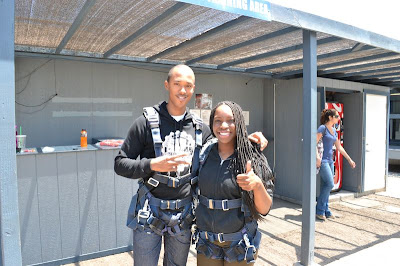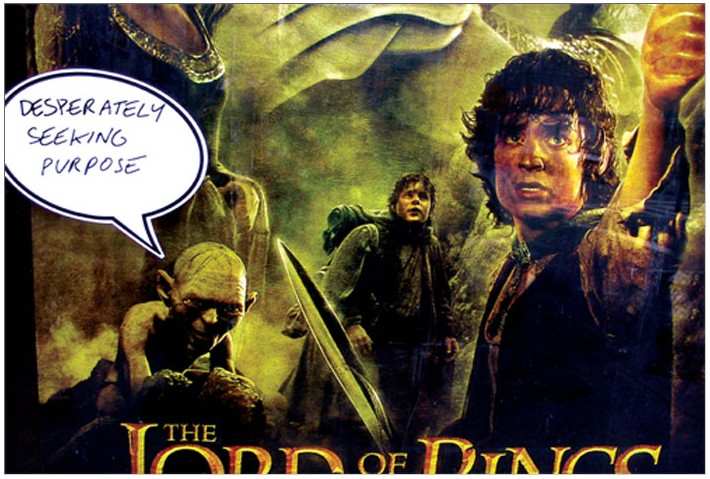"Go confidently in the direction of your dreams. Live the life you have imagined."
Henry David Thoreau
May 6, 2011.
Could have very well been the happiest day of my young, adolescent life. I shared a bit of my experience as a student in the commencement speech, was surrounded by loving friends and family, and knew that the next 12 months would be an incredible journey abroad.
During my transition from recent grad to a contributing citizen, there were a few things (read: rite of passages) and experiences that I had left to..well, experience. I wanted to be as bold as I told people to be. I wanted to challenge myself (although the challenge itself isn't the most fun part) and come to grips with my newfound responsibilities as an adult (paying back student loans, yuck).
During the subsequent 90 days, I began a freeing process that went a little something like this:
I moved out of my apartment, sold all of my things, packed up a suitcase with a week-and-a-half worth of clothes and took a flight to San Diego to crash at my parent's house. Unbeknownst to my mother, I had been planning a skydiving excursion for the past month, and needed a place to unwind and be pampered (in a way that only a mother could pamper her child).
What followed was a minute long free fall. I equate the feeling of free-falling to a quote from Steve Jobs:
"I didn't see it then, but it turned out that getting fired from Apple was the best thing that could have ever happened to me. The heaviness of being successful was replaced by the lightness of being a beginner again, less sure about everything. It freed me to enter one of the most creative periods of my life."
Even as I had done some cool things in college, people learn to uphold those expectations and sometimes, the burden of trying to live up to those expectations is a challenge. The heaviness of being successful as Steve Jobs states is the idea that success comes at a cost (and it does) and is a lot of hard work (which it is). There is something refreshing about starting over and being a novice at something. At the moment of the jump, the heaviness of the burden of expectation seemed to slowly fade and was replaced with a lightness that could only come at the beginning of something new. I was beginning a new chapter in my life. I was venturing into the unknown. I had no idea what was ahead of me, but my long journey was about to begin with a single step.
Doing something new (taking an cross-country Amtrak journey, engaging in an extreme sport, running a marathon, shark diving, etc.) can present a unique challenge. The act itself is a symbol of freedom—you're so close to nature and your natural self (full of fear, hehe)—that being thrown into the unknown and adapting is as freeing as the act itself.
Austin Kleon once wrote in his book, (which I highly recommend) Steal Like an Artist, that
"there is an economic theory out there that if you take the incomes of your five closest friends and average them, the resulting number will be pretty close to your own income."I agree with Austin when he says that believes the same is true with idea incomes. You'll only be as good as the people you surround yourself by. If they tell you garbage everyday, then everyday, you'll regurgitate...garbage. Iron sharpens iron, remember?
 When I was in middle school, I started hanging with the wrong crowd. My mom, who wasn't the biggest fan of these girls, decided to take a radical step: enter me in a lottery for an arts school. I was selected and transferred schools. I was not a happy camper (she told me only a few years ago that this was the sole reason why she entered me into the lottery).
When I was in middle school, I started hanging with the wrong crowd. My mom, who wasn't the biggest fan of these girls, decided to take a radical step: enter me in a lottery for an arts school. I was selected and transferred schools. I was not a happy camper (she told me only a few years ago that this was the sole reason why she entered me into the lottery).You see, had I continued growing older with these girls, I would have headed down a very (very) different path. Those girls didn't help me improve my idea income; if I would have stuck with them, they would have negated it.
Nowadays, I think about ideas often. I have an excel spreadsheet (appropriately named Idea Nation) dedicated to ideas. I carry a small notebook with me most of the time and am constantly typing things in notepad on my phone. Ideas are so important. They say a lot about who/what influences you. Who are the people who influence your ideas? Do they have a ton of them? Do they challenge your ideas or knock them down? (I have plenty of ideas that make me laugh when I read them out loud, but the fact that I have them to read aloud is enough for me).
You shouldn't act on every single good idea; let them marinate (some of my ideas have been chillin' in Idea Nation for almost a year now). If you were to act on every idea, you'll spread yourself thin and the very idea that deserves the most attention, won't get it.You can increase your idea income by surrounding yourself with people who have higher incomes than you. For me, I increased my idea income when I met my Luce Scholar family. The conversations and ideas that have come from these relationships has been mind blowing. For you, it could mean sharing your own ideas in the hopes that someone out there, reflects your beliefs and draws themselves closer to you (it happens, often!) Go somewhere that's always interested you. Find interesting events and things to do. Befriend interesting people.
Idea incomes. Don't go for broke.
A Think Week is a seven day stretch (or more, if you like) of seclusion to recharge your thinking and focus on personal development. It's a time where you can reflect on your past and your future, read about new ideas and make changes accordingly.
 |
| "Think Week" in Maui, Hawaii |
My digital friend (I haven't met him yet) Mike Karnjanaprakorn, said that during a recent Think Week he was able to
"make a clear decision on what I wanted to do next with my personal and professional life. By disconnecting from the world, time moved really slow. I really got to enjoy the moment, which we often neglect in our chaotic worlds."For many years, Bill Gates took two one-week Think Weeks a year. Family, friends and Microsoft employees were banned. There, he would read through hundreds of pages of employee manuscripts while pondering both the future of Microsoft and the creative thinking of his employees. By powering off, Bill Gates was able to usher in and facilitate the tons of innovations for Microsoft that came out of reading employee manuscripts during these Think Weeks.
Every seven years, Stefan Sagmeister, a graphic designer and typographer, takes a one-year sabbatical to refresh his thinking and renew his creativity. Working on the right thing is probably more important than working hard, right? After all, time is money. If one Think Week a year can help focus on the right thing, what's stoppin' you?
I was introduced to the concept of side projects by Facebook's Creative Director, Ji Lee. During his Creative Mornings talk (one of my favorite talks), he highlighted the transformative power of personal side projects, why everyone should have them, and how his side projects have helped him land amazing jobs.
Feeling uninspired at his job, he began venturing into various different side projects. Out of this un-inspiration, The Bubble Project was born. With his own money, he purchased 30,000 empty speech bubbles and pasted them on signs, wall posts, billboards, movie posters, etc. all over NYC. This side project became a viral interactive experience for everyone.
During his talk, he highlighted what having personal projects has taught him:
- Personal projects and professional projects compliment each other (you can get amazing professional opportunities that stem from a personal side project).
- The knowledge that you gain from your professional work (mass scaling, marketing, organizing etc.) can transfer to your personal projects.
- Creating a platform is powerful. Instead of focusing on yourself, create a project that captures the imagination of others. The best side projects are ones that engage audiences and allow them to share experiences.
A few months after graduating, I started my first side project in India. I set a minimum of a one year commitment. It's unreleased for now, but look forward to continuing the fun once I return stateside.
Starting a project on the side that excites you when your work is dull and mundane opens up amazing doors. When you're stuck at work, switch over. Split your time between the two, if you can! Most of Ji's favorite jobs have come from being recruited for work he had done on his side projects.
Side projects keep life fun and exciting.
5. Read
A few years ago, I was in line at a grocery store with a friend. I was reading a newspaper and this young guy came up and tried to smooth talk us. As he saw us looking at the newspaper, he made some sly gesture. When I asked him what he meant, he mentioned that he never read.
I admit, when I was in middle school and high school, I wasn't the biggest reader. Sure, I had my Mary-Kate and Ashley Olsen books stacked on my bookshelf and enjoyed fiction books from time to time, but I never really read for fun. Then I found some books worth reading.
I love reading. You should too! Anything that exists today can be found in the pages of books. No idea is new, it's just a remix of an old idea. Now, I mostly read books that improve my relationships—with God, myself, other people— as well as books on personal development, social psychology and career development.
After graduating, a mentor of mine gave me a book reader. It symbolized an investment that differed from my other graduation gifts. During my year in India, one of his only desires was for me to read (and save money). I loaded up on the books and began reading. Here is a pretty interesting list of books that I've picked through.
This last step to freeing your mind after graduation is (IMO) one of the more important ones. When you read, your mind stretches. It transforms and takes shape of the book or article that it's engulfed in. Anything becomes everything, possible is the name of the game and your brain is at the mercy of the author. It's magical.
—
On June 29, 2011, I made my journey across the Pacific. My post-graduation freeing process was a success. I was refreshed and renewed. I had never felt more liberated. This isn't a hard and fast list, just something that (in retrospect) really helped prepare me for the following journey.
Do you have any process of freeing your mind after a huge milestone?




Zim:
ReplyDeleteI thank you again for challenging us, young and old, to engage in activities that free and liberate our minds to reach our highest potential. The world is lacking in smart, intelligent leadership at a time when our planet is under siege, and familiar resources are scarcer than ever. Ingenuity, creativity, among other qualities, are essential for our future survival; your ideas present some of the building blocks. Keep them coming.